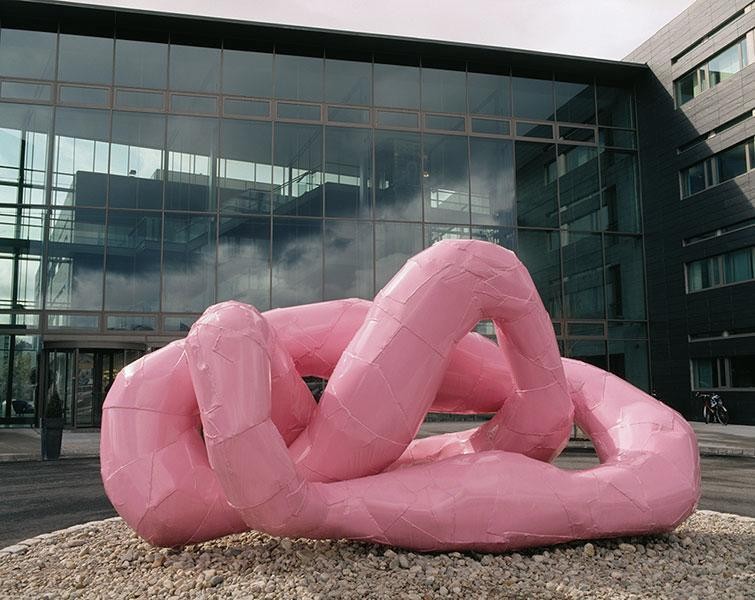Franz West
12 Sep - 10 Dec 2018
FRANZ WEST
12 Septembre – 10 Décembre 2018
From 12 September to 10 December 2018, the Centre Pompidou will present the biggest ever retrospective of the work of Franz West (1947–2012), including almost 200 artworks. Organized in collaboration with Tate Modern, London, it represents the first opportunity to acknowledge the role of the Austrian artist, one of the most influential figures of art of the last half-century.
The exhibition abundantly celebrates the artist’s work from 1972 to 2012. It includes his rarely exhibited drawings from the early 1970s as well as his first sculptures, the series of Passstücke, begun in 1973–74, and performative sculptures made to engage with the viewers to “reveal their neuroses”. The exhibition also includes a selection of the papier mâché sculptures of the 1980s, together with a number of collaborations with fellow artists, among them Herbert Brandl, Heimo Zobernig and Albert Oehlen.
The show also features West’s Lemurenköpfe or Lemur Heads, the collages and drawings of his later years, as well as models for open-air works and a selection of such sculptures, in addition to his furniture works, such as chairs and sofas.
These will be installed in the Forum at the Centre Pompidou and at a number of museums and organizations in the Marais, in an unprecedented partnership with nearby institutions, including the Musée national Picasso, the Musée Cognacq–Jay and the Bibliothèque historique de la ville de Paris.
The exhibition will highlight not only the artist’s outstanding capacity for formal invention, but also his irreverent and caustic sensibility.
Redefining sculpture in its relation to the body, the verbal and the viewer, he succeeded in creating an entirely original aesthetic. Anticipating the “trash” aesthetic of the 1990s, he constantly inverted the categories of the beautiful and the ugly, the repulsive and the seductive.
More than anyone else, West redefined the notions of authorship and collaboration between artists, from visual artists to writers or musicians. The exhibition also considers West’s passion for music and the importance of philosophy and psychoanalysis for him, especially through the legacy of Ludwig Wittgenstein and Sigmund Freud.
Shown at the entrance to Galerie 2, the installation Auditorium – first created for Kassel’s documenta 9 in 1992, and an allusion to Freud’s psychoanalysis couch – will be to host to a programme of performances and discussions with a dozen of invited guests: curators, artists, musicians and friends of West’s, among them Bice Curiger and Kasper König.
The exhibition is organised by Christine Macel, Chief curator at the Centre Pompidou and Head of the Department of Contemporary Art and Prospective, and Mark Godfrey, Senior Curator, International Art (Europe and the Americas) at Tate Modern, London.
They are assisted by Loïc Le Gall and Luise Willer of the Centre Pompidou and Monika Bayer-Wermuth of Tate Modern.
The 224-page catalogue features essays by Christine Macel, Mark Godfrey and Martin Prinzhorn, as well as some thirty personal contributions by artists, curators, gallerists, and the artist’s friends. It also includes an informative illustrated biography.
12 Septembre – 10 Décembre 2018
From 12 September to 10 December 2018, the Centre Pompidou will present the biggest ever retrospective of the work of Franz West (1947–2012), including almost 200 artworks. Organized in collaboration with Tate Modern, London, it represents the first opportunity to acknowledge the role of the Austrian artist, one of the most influential figures of art of the last half-century.
The exhibition abundantly celebrates the artist’s work from 1972 to 2012. It includes his rarely exhibited drawings from the early 1970s as well as his first sculptures, the series of Passstücke, begun in 1973–74, and performative sculptures made to engage with the viewers to “reveal their neuroses”. The exhibition also includes a selection of the papier mâché sculptures of the 1980s, together with a number of collaborations with fellow artists, among them Herbert Brandl, Heimo Zobernig and Albert Oehlen.
The show also features West’s Lemurenköpfe or Lemur Heads, the collages and drawings of his later years, as well as models for open-air works and a selection of such sculptures, in addition to his furniture works, such as chairs and sofas.
These will be installed in the Forum at the Centre Pompidou and at a number of museums and organizations in the Marais, in an unprecedented partnership with nearby institutions, including the Musée national Picasso, the Musée Cognacq–Jay and the Bibliothèque historique de la ville de Paris.
The exhibition will highlight not only the artist’s outstanding capacity for formal invention, but also his irreverent and caustic sensibility.
Redefining sculpture in its relation to the body, the verbal and the viewer, he succeeded in creating an entirely original aesthetic. Anticipating the “trash” aesthetic of the 1990s, he constantly inverted the categories of the beautiful and the ugly, the repulsive and the seductive.
More than anyone else, West redefined the notions of authorship and collaboration between artists, from visual artists to writers or musicians. The exhibition also considers West’s passion for music and the importance of philosophy and psychoanalysis for him, especially through the legacy of Ludwig Wittgenstein and Sigmund Freud.
Shown at the entrance to Galerie 2, the installation Auditorium – first created for Kassel’s documenta 9 in 1992, and an allusion to Freud’s psychoanalysis couch – will be to host to a programme of performances and discussions with a dozen of invited guests: curators, artists, musicians and friends of West’s, among them Bice Curiger and Kasper König.
The exhibition is organised by Christine Macel, Chief curator at the Centre Pompidou and Head of the Department of Contemporary Art and Prospective, and Mark Godfrey, Senior Curator, International Art (Europe and the Americas) at Tate Modern, London.
They are assisted by Loïc Le Gall and Luise Willer of the Centre Pompidou and Monika Bayer-Wermuth of Tate Modern.
The 224-page catalogue features essays by Christine Macel, Mark Godfrey and Martin Prinzhorn, as well as some thirty personal contributions by artists, curators, gallerists, and the artist’s friends. It also includes an informative illustrated biography.

